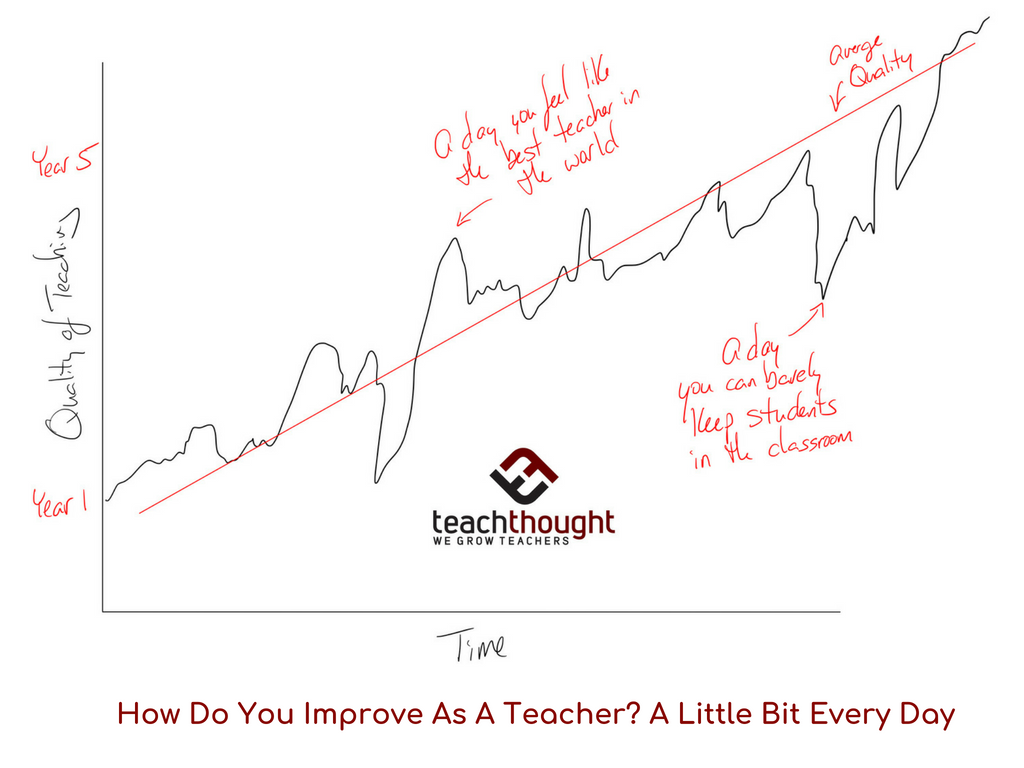
What Does Teacher Improvement Look Like?
by Terry Heick
Your work as a teacher is a journey.
And it is very much still work, but the metaphor of a journey may be a more accurate representation of its character than reducing to ‘work’ and ‘effort.’
Let me explain.
Whether it lasts 25 years or four, your journey as a teacher begins when it begins and ends when it ends and along the way, hopefully, you did all the things you thought you were right. And really that’s it. You’re a person and this is all living, and from relationships to parenting to buying a home or making the decision to pull back from something altogether–this kind of abstraction applies to almost everything you do.
What Is The Metric Of Good Teaching?
The ultimate metric for your teaching is the quality of the lives of the children after your journey and their journey diverge–which is, of course, borderline immeasurable.
This means that teachers are in a unique position of being blind to the outcomes of their work, which can be soul-deadening, and at best creates a kind of opacity and blindness. That teachers must work tirelessly in such relative blindness, with only minor episodes of empirical data that demonstrate student growth is detrimental to both teachers and students because it obscures the feedback loop.
Feedback loops are how the brain learns; it learns that when you do X, Y happens. The neocortex is constantly looking for patterns, and then the reinforcement of those patterns. (Which is where confirmation bias can become a problem.) When the data you, as a teacher, look for or are presented with is either misleading, narrow, or altogether wrong, it’s not just confusing, it can force you to settle for ‘other data’: a note from a parent, the smile of a child, a child that starts doing something without needing to be asked, or even just asks a good question during a time when you really needed to hear one.
This is common and can be soothing, but can also reduce the quality of your teaching. Some days are going to be bad. Some lessons or units or even entire school years are going to challenge you in every way: intellectually, professionally, physically, and psychologically. That’s why it’s important to find little data points–formal or informal–that make sense to you and can let you know if ‘you’re doing it right’ or we can’t improve the quality and efficiency or accuracy of our pedagogy. When those data points are ‘wrong’–that is, don’t give you the right information at the right time in a way that’s tied directly to the process of teaching and learning–the feedback loops are broken.
Or at least the right feedback loops.
Teaching Is A Journey; Stop Worrying And Grow
I’ll talk more about feedback loops in another post because I think they’re at the core of the growth of a teacher. For now, let’s return to the metaphor of teaching as a journey. Part of the solution here is to find the right data to create the right feedback loops in the day to day, while on a broader level staying focused on the trend of the journey itself.
Are you trending down? Is your teaching atrophying? Losing its force or vision and imagination?
Is it more of a flat line–relatively unchanging? A little ‘better’ here, a little ‘worse’ there?
Or is it trending up? Are you growing? Some days or even weeks you may stagger back a little, only to push back hard and grow through smart feedback loops and accuracy (not sheer will, which isn’t sustainable)?
If you can imagine the quality/performance of your teaching in a little line graph, that line is going to be jagged–it will go up and down based on your decisions on their effects. What you want to see is that, in general, a line trending up over time.
You’re human. You deserve to know that you’re making a difference in the lives of children (there’s that metric again), but this is more than that. On a physiological level, without that kind of feedback and without the internal belief that your abilities as a teacher are indeed trending up and growing, you can end up just a little unsure if you’re doing the right thing. A little unsure if that new learning model or literacy strategy or app is actually ‘working.’
In this circumstance, there’s no real sense that you’re growing and that you can truly help students grow–and that can and will destroy your will to teach over time.
So don’t do that. Tighten up those feedback loops, and see the big picture of your teaching drawn our over time–starting here, ending there, and in between full of new ideas, enthusiasm, and professional improvement. Trust that five years from now, you’re going to be a little more efficient, a little more wise, and a little more well-versed in the kinds of ideas, models, strategies, and thinking that can help you truly grow and stretch the minds of others.
But to help students master this process, you have to first master it in yourself.
How Do You Improve As A Teacher? A Little Bit Every Day

